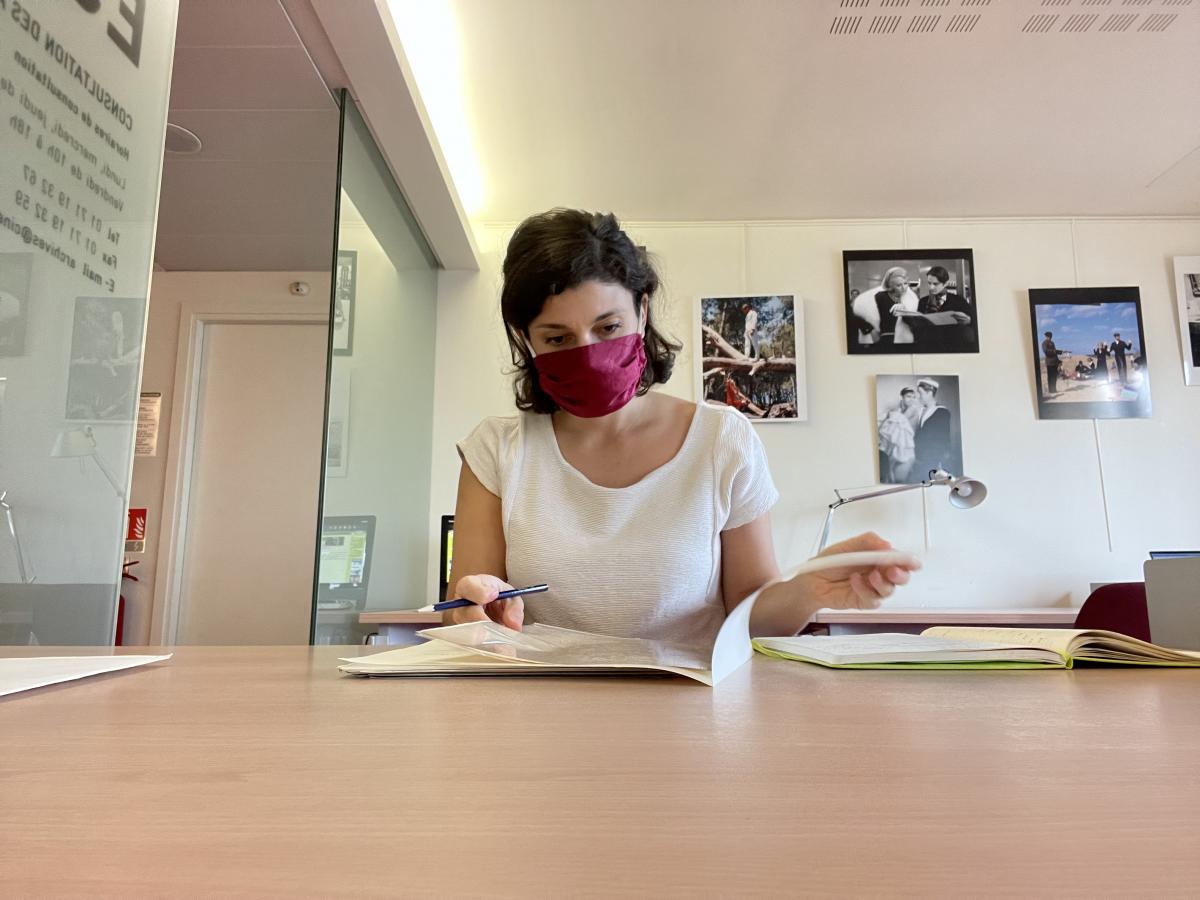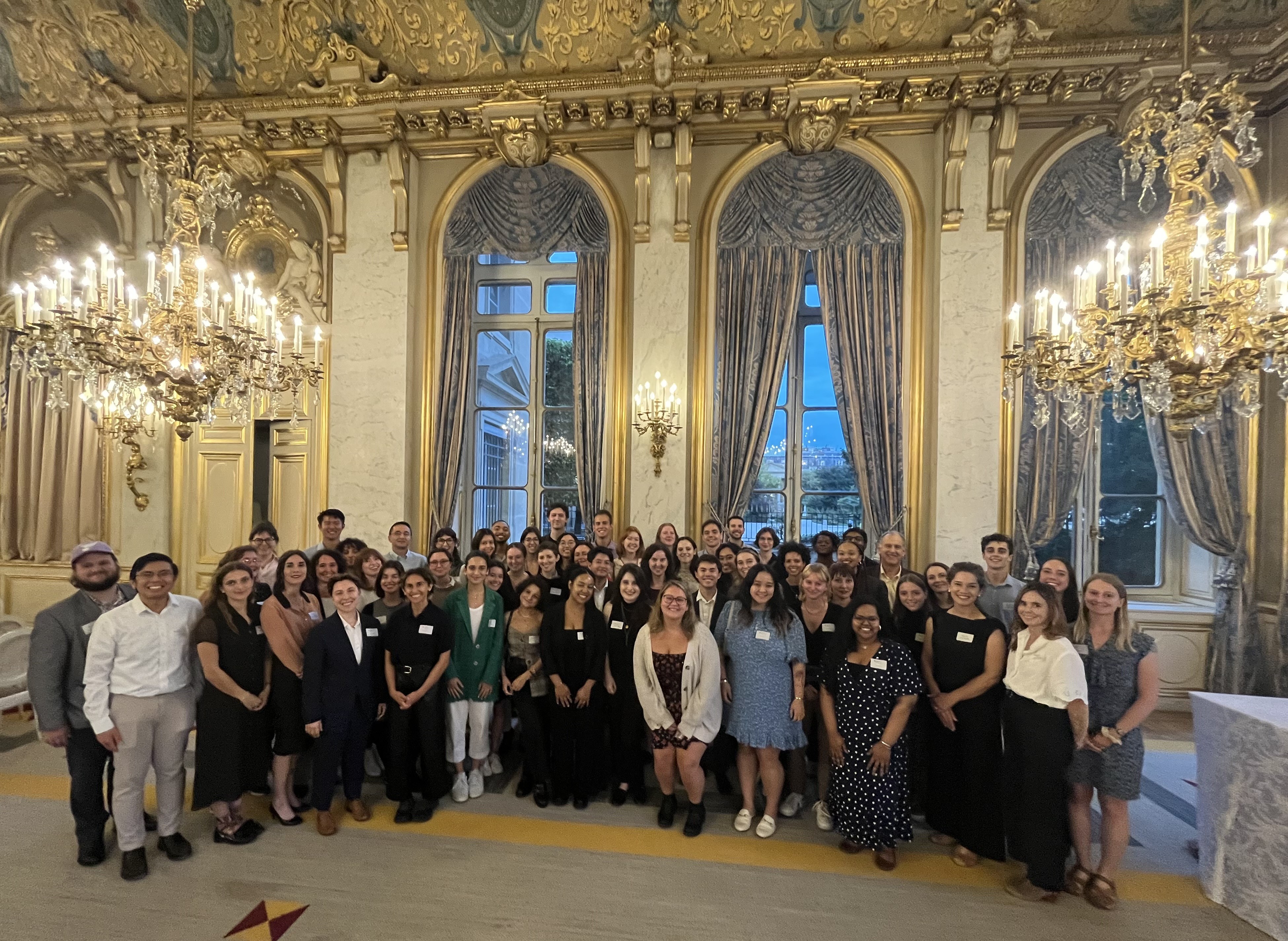French Studies (Arts, Humanities and Social Sciences)
France
Number of recipients
In addition to being a prestigious academic exchange program, the Fulbright Program is designed to expand and strengthen relationships between the people of the United States and citizens of other nations and to promote international understanding and cooperation. To support this mission, Fulbright Scholars may be asked to give public talks, mentor students, and otherwise engage with the host community, in addition to their primary activities.
Conduct research in any field in the humanities or social and political sciences and collaborate with colleagues at French research centers and higher education institutions.

Laure Astourian (Fulbright 2021) consulting the Cinémathèque (film studies) archives
Any appropriate French research center or higher education institution.
Applicants may propose projects in metropolitan France or any of the DROM-COM (overseas regions and departments), such as Guadeloupe, Martinique, Réunion, French Guiana, French Polynesia, Mayotte, and New Caledonia.
All applicants must meet the Program eligibility requirements (click to review the requirements).
Applicants are encouraged to register qualified language evaluator, such as a language instructor or a translator, to conduct the external assessment in the application. Being a native speaker alone does not qualify an individual to conduct the assessment.
Applicants who are native speakers do not need to complete an external evaluation.
You may be asked to participate in an interview as part of the in-country selection process.
Charlotte Goodwin, US Program Officer at the Franco-American Fulbright Commission
Guide to research in France
Finding a research laboratory in France
€2,600-€3,000 (approx. $2,800-$3,200) per month depending on the city of placement. There is no allocation for accompanying dependents. Applicants are responsible for finding their own housing, although some host institutions may facilitate the process. The Euraxess network can also help with housing and local logistics.
International travel allowance provided for grantee only. All research scholars receive a travel allowance of €1,200 (approx. $1,300).
France offers free public schooling from nursery school through high school of excellent quality. The French healthcare system is among the best in the world. It is very easy to book appointments with healthcare professionals, and costs are affordable. A standard doctor's visit costs 26.50 euros (approximately $28). Housing can be expensive, particularly in the bigger cities. In Paris, the average rent for a two-room apartment is around $1400 per month, and $900 per month for a studio apartment. There are comprehensive public transportation and high speed rail networks throughout France. In Paris, an annual adult public transportation pass costs between 700 and 800 euros (approximately $870). There are reduced prices available for seniors, young adults, and children.
Visa fees will be waived for Fulbright grantees and their accompanying dependents. The Fulbright Commission will provide support and guidance for the visa process.
Through a new partnership between the Franco-American Fulbright Commission and the Collegium de Lyon, applicants to one of the three national Fulbright scholarship programs (All Disciplines, French Studies, Fulbright-Tocqueville) who wish to be hosted in a research unit in Lyon or Saint-Etienne are now eligible for a Collegium fellowship. This includes all-inclusive housing in the Collegium residence on the ENS de Lyon campus, assistance with administrative formalities, and integration into the 2025-2026 interdisciplinary cohort of international fellows.
The Collegium de Lyon is the Institute for Advanced Study of the University of Lyon, the umbrella organization that brings together all the major academic institutions in the Lyon/Saint-Etienne area. With nearly 200 research units (many of them inter-institutional) in virtually all disciplines, the University of Lyon is France's second largest academic research cluster.
The Collegium hosts international fellows for research stays of 5 or 10 months (from September to January and/or February to June) that foster ambitious and innovative research in all disciplines, as well as participation in the collective dynamics of the local research ecosystem.
Scholars interested in the Collegium fellowship program are asked to include a letter of support from the director of the targeted research unit at the University of Lyon with their Fulbright application.
Website: https://collegium.universite-lyon.fr
Contact email: collegium@universite-lyon.fr
Final grant amounts will be determined prior to the start of the academic year and are subject to the availability of funds. The United States Department of State and the Fulbright Commission in the host country reserve the right to alter, without notice, participating countries, number of awards and allowances.
France
Why France?
France has been the world's top tourist destination for over 25 years. Visitors come from all over to enjoy French cuisine, tour its famous museums and monuments, and explore its beautiful cities. More on French tourism and attractions.
The country has an excellent and accessible healthcare system, a high-quality public school system starting at nursery school, comprehensive public transportation and high-speed rail networks, and lively cultural scene.
France is also a key place to do research, teach, or pursue professional development. It is home to 72 universities, 227 engineering schools, 220 business schools, 45 state art schools, 22 architecture schools, and 3000 private institutions of higher education. Research is a high priority: 2.22% of the country's GDP is devoted to research and development. The CNRS (national scientific research council) produces the highest number of scientific publications in the world. More on reasons to choose France and the French research landscape.
Applicants can find useful practical information about life in France (housing, schooling, etc.) through the free national Euraxess network.
Being a Fulbrighter in France

Fulbright France hosts two all-grantee events every year (orientation in September and mid-year meeting in February) in Paris. Fulbrighters gather together to get practical information, meet each other, learn about important issues in French society, and explore the cultural sites of Paris. There are also other activities on offer, including conferences, informal gatherings around a galette des rois or French cheeses, and concerts from Fulbright musicians.
Candidates interested in applying can visit the Franco-American Commission's website. For more detailed information, contact Charlotte Goodwin, US Program Officer at the Franco-American Fulbright Commission, at cgoodwin@fulbright-france.org.
Quotes from Fulbright scholar alumni:
"My fellowship helped me establish new connections and cement existing research collaborations with French scientists and their students in a substantial way that will carry forward for at least the next decade. The program also gave me a new window into the graduate education of French students that I will bring back to my home institution and that will benefit them and future exchanges that will occur. Finally, the experience gave me, and my family a much more detailed picture and appreciation of France and its people with new insights into its history and prehistory, people, and society."
"I refer to this year as the 'magical year' because I was able to focus on my research, to make enduring connections with researchers based in France, to drastically deepen my ability to work in French, and to enjoy my daily life in a way I often find impossible while I’m in the midst of a full semester of teaching, administrative work, and meetings at my home institution. I came to better understand French academia and to build professionally meaningful relationships at my host institution. I was a citizen of a city, a member of an institution, and a speaker of a language in which I was immensely happy."
“The Fulbright program enabled me to develop several completely new avenues of research that would have been absolutely impossible without having this extended time to be in residence in my French host lab. On a personal level, Fulbright enabled me and my family to have a fascinating and immersive year in European culture that will especially benefit our kids for decades to come.”
Fulbright France has an active YouTube channel with many interviews of Fulbrighters past and present: https://www.youtube.com/user/ComFulbrightFR.
Visit our Scholar Directory to view and search all Fulbright alumni. You can also learn more about Fulbright Alumni Ambassadors.

Applications are welcome from recent PhDs as well as more established scholars. The Franco-American Commission also encourages applicants from the private sector.